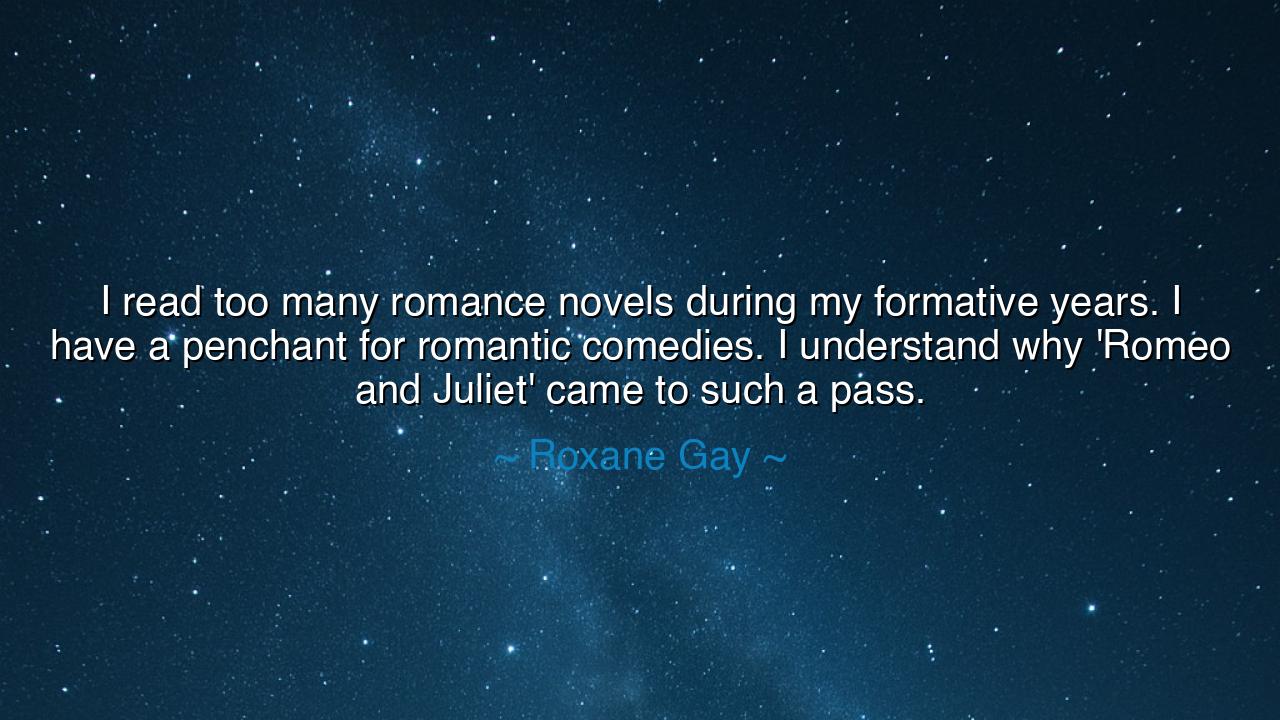
I read too many romance novels during my formative years. I have
I read too many romance novels during my formative years. I have a penchant for romantic comedies. I understand why 'Romeo and Juliet' came to such a pass.






"I read too many romance novels during my formative years. I have a penchant for romantic comedies. I understand why 'Romeo and Juliet' came to such a pass." These words, spoken by Roxane Gay, speak to the powerful influence of romance, storytelling, and the ways in which they shape our perceptions of love, relationships, and destiny. The reference to Romeo and Juliet, Shakespeare’s tragic tale of star-crossed lovers, carries with it a timeless reflection on how the romantic ideal—be it in literature or life—can often lead us down paths of passion, obsession, and consequence. To understand this, we must delve deep into the nature of romance, how it fills our hearts with dreams and expectations, and how those same dreams, when taken to extremes, can spiral into tragic outcomes.
In the ancient world, romantic stories were often woven into the fabric of cultural life. From the epic romance between Orpheus and Eurydice, where love and loss are inextricably tied, to the Greek tragedies where the pursuit of love often led to great suffering, romance was seen not just as a joyful experience but a force that shaped the fate of gods and mortals alike. In many ways, these tales were warnings, showing that love, while a powerful and beautiful force, could also lead to destruction when it was pursued without wisdom. The story of Romeo and Juliet, while born of a different time, shares the same archetype: love as an uncontrollable, overwhelming force that leads to consequences far beyond the lovers’ understanding.
Roxane Gay’s acknowledgment of her own deep connection to romantic comedies and novels brings to the forefront the immense power that stories of love have over our expectations. These tales shape the way we view not only the world around us but also the very way we imagine ourselves in love. For those who grow up immersed in romantic fiction, the idea of love is often idealized, exaggerated, and shaped by the stories they read and the myths they encounter. The passion of a love that transcends all obstacles, the fairy-tale endings, and the dramatic moments of connection are all deeply ingrained in the psyche, and they carry with them an inherent danger. As Gay reflects, it is easy to understand how such an idealized view of love can lead one to Romeo and Juliet’s tragic end, where the forces of impetuosity and passion overwhelm all reason and caution.
Yet, what can we learn from this reflection? Romeo and Juliet is not merely a tale of forbidden love; it is a story of how romantic idealism can become a double-edged sword. The tragedy unfolds not because the lovers are destined to be apart, but because they are unable to see beyond their own feelings, their idealized vision of love. They do not pause to consider the consequences of their actions, nor do they understand that their love, while pure, is unbalanced and fueled by haste. The intensity of their passion blinds them to the wisdom that would have allowed them to navigate their love more wisely. In this, we find a warning: while love is a beautiful force, it must be tempered with reason, reflection, and an understanding that true love requires not just feeling, but wisdom and care.
Consider the story of Napoleon Bonaparte and Josephine, a love that spanned both triumph and tragedy. Napoleon, the great military leader, fell deeply in love with Josephine, despite her previous relationships and his own political ambitions. The passion between them was undeniable, but over time, Napoleon’s obsession with Josephine led to heartbreak and personal loss, culminating in their eventual separation. Though their love was fierce, it was also impractical and driven by the intense romantic ideal rather than a grounded understanding of one another’s needs and circumstances. Josephine was unable to provide Napoleon with the heirs he desired, and Napoleon’s ambition for power eventually overtook his passion for her. In the end, love that was once seen as all-consuming proved itself to be fragile when not balanced with the realities of their world.
The lesson here, dear listeners, is this: the romantic ideal that we often carry within us—the belief that love will conquer all, that passion is enough to carry us through life’s trials—can be both a gift and a curse. Love is one of the most powerful forces in the human experience, but it requires wisdom and patience to thrive. We must learn to balance the fire of passion with the grounding influence of reason and reflection. Roxane Gay’s words offer a powerful reminder that while the stories we read may fill our hearts with longing and hope, they also serve as a reminder that romance is not the final answer. In real life, the course of true love does not always run smooth, and it is through reflection, maturity, and understanding that we can build relationships that are not only fulfilling but lasting.
In your own life, be aware of the stories you tell yourself about love. While it is good to dream, it is equally important to recognize that romance—though intoxicating—is not a force that exists outside the need for practical wisdom and self-awareness. True love is not just about grand gestures and dramatic moments; it is about communication, trust, and understanding. When love is cultivated with patience and care, it becomes a force for growth and connection rather than tragedy. So, embrace romance with your heart, but never forget to temper it with the lessons of wisdom passed down through the ages.






AAdministratorAdministrator
Welcome, honored guests. Please leave a comment, we will respond soon